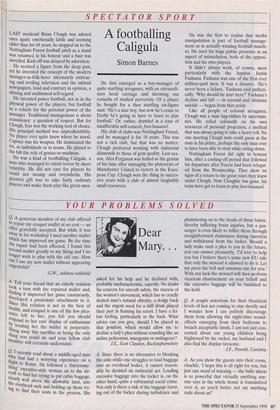SPECTATOR SPORT
LAST weekend Brian Clough was adored once again: emotionally labile and seeming older than his 64 years, he stepped on to the Nottingham Forest football pitch as a stand was renamed in his honour and a bust was unveiled. Kick-off was delayed by adoration.
He seemed a figure from the deep past, yet he invented the concept of the modern manager-as-folk-hero: alternately embrac- ing and reviling television and the tabloid newspapers, loud and contrary in opinion, a shining and undimmed self-regard.
He invented power football, not as in the physical power of the players, but football as a vehicle for the personal power of the manager. Traditional management is about consistency: a question of respect. But for Clough, fear was the working tool of choice. His principal method was unpredictability. No player ever quite knew where he stood. Caprice was his weapon. He dominated the lot, as individuals or in teams. He played to the hilt the role of genius-or-madman. He was a kind of footballing Caligula, a man who managed to extort terror by sheer volatility. He did not care for players he Could not swamp and overwhelm. His greatest gift was to take fairly ordinary Players and make them play like great ones.
A footballing Caligula
Simon Barnes
He first emerged as a boy-manager of quite startling arrogance, with an extraordi- nary head carriage and throwing out remarks of studied perversity. Of a player he bought for a then startling six-figure sum: 'He's a nice boy, but now he's come to Derby he's going to have to learn to play football.' Or, rather, drawled in a tone of insufferable self-conceit, foot-baaaawl.
His club of clubs was Nottingham Forest, and he managed it for 18 years. This was not a rich club, but that was no matter: Clough preferred working with industrial diamonds to those of gem quality. Last sea- son, Alex Ferguson was hailed as the genius of his time after managing the plutocrats of Manchester United to victory in the Euro- pean Cup. Clough won the thing in succes- sive years with a club of almost laughably small.resources. He was the first to realise that media manipulation is part of football manage- ment as in actually winning football match- es. He used his huge public presence as an aspect of intimidation, both of the opposi- tion and his own players.
It didn't always work, of course, most particularly with the hapless Justin Fashanu. Fashanu was one of the first ever million-quid men. It was a disaster. 'He's never been a failure,' Fashanu said patheti- cally. 'Why should he start here?' Fashanu's decline and fall — in scandal and ultimate suicide — began from that point.
Like all people of colossal arrogance. Clough was a man hag-ridden by uncertain- ties. He relied colossally on his own resources of personal projection, a method that was always going to take a heavy toll. No one meeting Clough now could guess at the man in his prime, perhaps the only man ever to have been able to strut while sitting down.
Nottingham Forest did right to honour him, after a cooling-off period that followed his departure after Forest had been relegat- ed from the Premiership. They show no signs of a return to the great years they knew under Clough. Now Cloughie has gone, his team have got to learn to play foot-baaaawl.


























































































 Previous page
Previous page